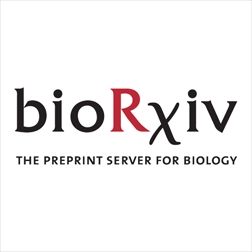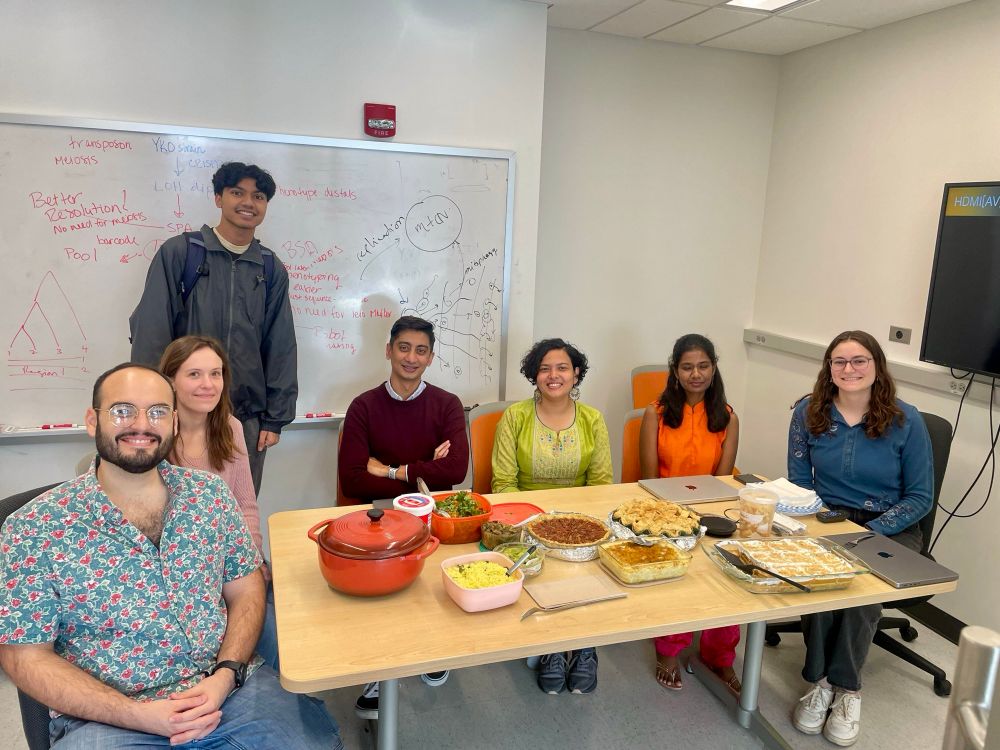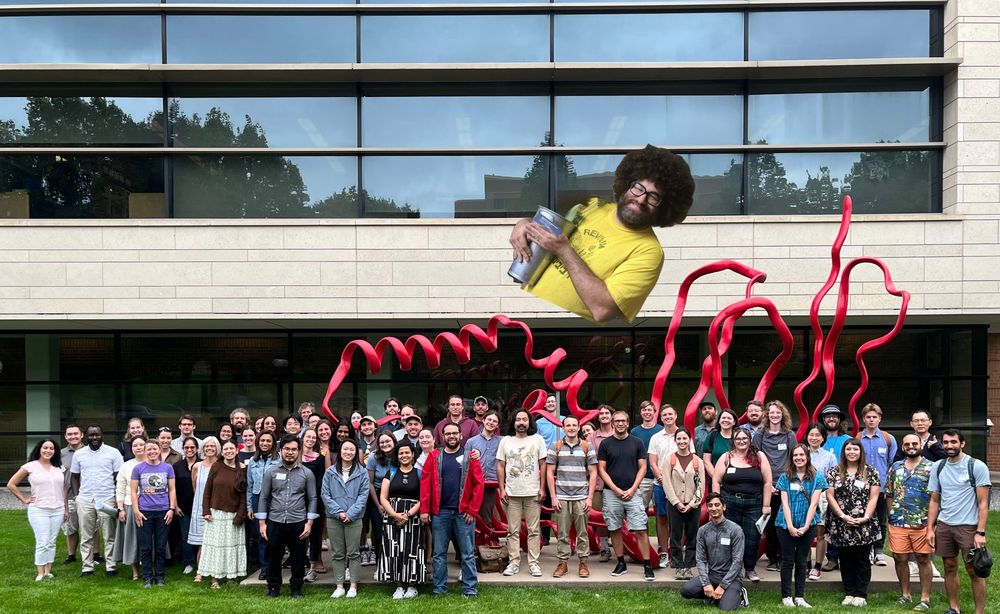Glad to be part of a community that values the well-being and safety of its neighbors.
23.01.2026 23:15 — 👍 11 🔁 3 💬 0 📌 0Glad to be part of a community that values the well-being and safety of its neighbors.
23.01.2026 23:15 — 👍 11 🔁 3 💬 0 📌 0
We visited Renee Good's memorial.
There, we met a group of Somali Minnesotans — who too have been viciously attacked for weeks — warmly hosting everyone.
Flowers & stuffed animals galore.
Neighbors continually offering sambusas & hand-warmers & water.
Grief. And belief.
Scenes from Minneapolis:

My phone looks a little different from yours
06.01.2026 03:21 — 👍 7 🔁 0 💬 1 📌 0
I'm just delighted to announce our new preprint on genome-scale perturb-seq in CD4+ T cells. We learned both general lessons about the power of perturb-seq, and specific lessons about T cell biology.
Led by amazing postdocs Emma Dann and Ronghui Zhu, with my wonderful collaborator Alex Marson.

My second dissertation paper is now out in @natcomms.nature.com! Here we introduce the co-expression-wide association study (COWAS) method for identifying pairs of genes or proteins whose genetically regulated co-expression is associated with complex traits. 🧵⬇️
www.nature.com/articles/s41...

Preprint online right before the holidays! Excited to share the first piece of work from the Zhang Lab, led by my absolutely stellar postdoc Michelle Kim! In this work, we ask how admixture, selection and demography shape complex trait genetics and GWAS performance www.biorxiv.org/content/10.6...
16.12.2025 13:47 — 👍 44 🔁 21 💬 1 📌 0Directional LD won’t be there *in expectation* in the absence of selection but can arise for a given realization of effects even for neutral traits.
02.12.2025 18:52 — 👍 2 🔁 0 💬 1 📌 0Presumably your effects are drawn randomly and iid so this is expected. I suspect you’d see a difference if you introduce directional LD
02.12.2025 15:28 — 👍 1 🔁 0 💬 1 📌 0As promised, a longer thread on what I consider to be some of the most interesting and important contributions of this paper (1/10)
01.12.2025 21:20 — 👍 14 🔁 7 💬 1 📌 2

Our first labsgiving/Diwali celebration 🪔!
22.11.2025 01:16 — 👍 10 🔁 0 💬 0 📌 1Hey Yaniv Brandvain is not on Bluesky but his most recent biostats ebook is live ybrandvain.github.io/biostats/. His stats resources have been so helpful to me as I develop my own stats course, so check it out. Github repo here: github.com/ybrandvain/b...
24.10.2025 14:47 — 👍 86 🔁 51 💬 3 📌 3
reminder that my (wonderful, diverse, interdisciplinary) department at the University of Oregon is seeking applications for an Associate/Full Professor of Data Science -- deadline 10/31 and only cover letter/CV needed to apply
academicjobsonline.org/ajo/jobs/30328
I'm recruiting a postdoc for my group (based in beautiful Eugene, OR). Please get in touch if you're interested, esp if you'd like to chat at #ASHG25!
15.10.2025 12:52 — 👍 40 🔁 42 💬 0 📌 1We're excited to be recruiting an NIH funded postdoc to work in the Coop lab at UC Davis. We're specifically interested in candidates who are want to work at the intersection of human genetics, GWAS, and population genetics modeling. Please RT
15.10.2025 15:53 — 👍 162 🔁 211 💬 1 📌 5
If you are at #ASHG2025 and would like to chat in person, please reach out! My lab is looking for curious scientists to join us, especially (but not limited to) postdoctoral researchers.
14.10.2025 15:45 — 👍 5 🔁 4 💬 0 📌 0I will presenting a poster on Thursday on our recent work led by Kelsey Johnson (USC, not on Bluesky) on the genetic architecture of mtDNA copy number in human milk! Board #3049T!
14.10.2025 03:11 — 👍 3 🔁 2 💬 0 📌 0@nicole-kleman.bsky.social also presenting on Wednesday on disentangling the effects of increased genetic diversity vs stratification in contributing to PGS prediction accuracy in admixed cohorts.
14.10.2025 03:11 — 👍 0 🔁 1 💬 1 📌 0@sol-tb.bsky.social presenting on Wednesday on her work on the genetic architecture of mtDNA copy number in South Asians
14.10.2025 03:11 — 👍 0 🔁 1 💬 1 📌 0We will be at #ASHG25 this year! Some presentations from our group, please stop by! :
14.10.2025 03:11 — 👍 8 🔁 2 💬 1 📌 0🔔 Excited to share our preprint from the largest ever exome-wide association study for T2D in South Asians. We make important discoveries implicating the genes HNF4A, GP2, RNF19A in the aetiology of diabetes and metabolic traits in south Asians. 👉 Read it here:
09.10.2025 06:48 — 👍 1 🔁 4 💬 1 📌 0
Whoops, wrong hashtag.
If you are going to #ASHG25, check out the line-up!
This is perfect if you are a trainee who needs to network but has no idea how to do it. Instead of trying to corner someone at the posters (which is stressful!), schedule a slot and sit down for 15 minutes to chat!
Yes to both. Coverage can be uneven so good to be sure but probably overkill for mtDNA
01.10.2025 14:20 — 👍 1 🔁 0 💬 0 📌 0We’ve done the former with mt genomes. I believe you end up with ./. calls for sites where only a few individuals carried an alt allele. So there’s an extra step (we wrote a script) to go through and fill those in with ref after making sure there were enough reads supporting that site
01.10.2025 13:00 — 👍 2 🔁 0 💬 1 📌 0Super excited to see our reference bias work out in Cell! Reviewers gave us some excellent ideas, and Maria added on some new analyses that broke down how SNPs from heterospecific references mapped or did not map in a conspecific reference.
22.09.2025 20:12 — 👍 14 🔁 4 💬 1 📌 0
Save the date! #PEQG26 June 9-12 2026 in Asilomar, CA. Happens only every 2yrs, but is my favorite conference. Full website coming soon, and registration and abstract submission opens November 14, but I'm allowed to tease that keynotes will be @jnovembre.bsky.social @jennytung.bsky.social and me!
03.09.2025 18:51 — 👍 64 🔁 43 💬 2 📌 1
I made a video about my new paper. I hope you enjoy it!
vimeo.com/1113132836?s...
Commensurate with his presence 😂🤣
23.08.2025 14:27 — 👍 1 🔁 0 💬 0 📌 0
Another fun year for the #mwpg, this year at the University of Minnesota! Great to see all the trainees participating with their cool work.
23.08.2025 14:07 — 👍 9 🔁 1 💬 1 📌 0
Huge congratulations to my friend @mitopr.bsky.social on being selected as a Pew Biomedical Scholar!
www.pew.org/en/projects/...
AlphaSimR course edin.ac/3wfGSEj Week 3 opens with a discussion on genetic variation between relatives, with a focus on siblings. While mutation is the ultimate source of genetic variation (by introducing new alleles), recombination shuffles the existing genetic variation through meiosis.
11.08.2025 11:09 — 👍 4 🔁 1 💬 1 📌 0